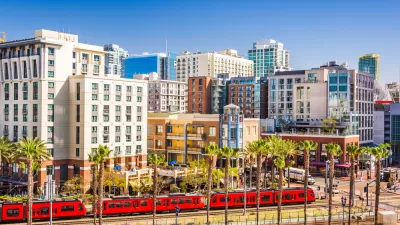San Diego finds itself having to explain how its inclusionary zoning program spending diverged from expectations.

Lisa Halverstadt reports that San Diego's inclusionary zoning program isn't paying as much to build affordable housing as advertised.
A Voice of San Diego analysis reveals nearly a quarter of the roughly $85 million in inclusionary funds doled out by city housing officials over the last 15 years have supported programs to aid first-time homebuyers and homeless San Diegans, or covered administrative costs at the San Diego Housing Commission, rather than simply bankroll the housing the policy aims to deliver.
The news comes as the city prepares to rework its inclusionary zoning policy in response to a new state law that allows steeper inclusionary zoning mandates. "City Council Democrats and labor leaders want to rework the policy to force more affordable housing production in market-rate projects, limit instances where developers can opt to pay fees and increase charges for builders who decide to pay," according to Halverstadt.
The article includes a lot more detail about the kind of projects that have been funded by the city's inclusionary zoning program, how that spending falls short of the expectations of experts and advocates who helped create the program, and how city officials defend the spending.
FULL STORY: Nearly One-Fourth of Funds Meant to Bankroll Affordable Housing Went to Other Causes

Alabama: Trump Terminates Settlements for Black Communities Harmed By Raw Sewage
Trump deemed the landmark civil rights agreement “illegal DEI and environmental justice policy.”

Study: Maui’s Plan to Convert Vacation Rentals to Long-Term Housing Could Cause Nearly $1 Billion Economic Loss
The plan would reduce visitor accommodation by 25% resulting in 1,900 jobs lost.

Planetizen Federal Action Tracker
A weekly monitor of how Trump’s orders and actions are impacting planners and planning in America.

Waymo Gets Permission to Map SF’s Market Street
If allowed to operate on the traffic-restricted street, Waymo’s autonomous taxis would have a leg up over ride-hailing competitors — and counter the city’s efforts to grow bike and pedestrian on the thoroughfare.

Parklet Symposium Highlights the Success of Shared Spaces
Parklets got a boost during the Covid-19 pandemic, when the concept was translated to outdoor dining programs that offered restaurants a lifeline during the shutdown.

Federal Homelessness Agency Places Entire Staff on Leave
The U.S. Interagency Council on Homelessness is the only federal agency dedicated to preventing and ending homelessness.
Urban Design for Planners 1: Software Tools
This six-course series explores essential urban design concepts using open source software and equips planners with the tools they need to participate fully in the urban design process.
Planning for Universal Design
Learn the tools for implementing Universal Design in planning regulations.
Caltrans
Smith Gee Studio
Institute for Housing and Urban Development Studies (IHS)
City of Grandview
Harvard GSD Executive Education
Toledo-Lucas County Plan Commissions
Salt Lake City
NYU Wagner Graduate School of Public Service





























